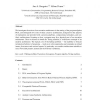Free Online Productivity Tools
i2Speak
i2Symbol
i2OCR
iTex2Img
iWeb2Print
iWeb2Shot
i2Type
iPdf2Split
iPdf2Merge
i2Bopomofo
i2Arabic
i2Style
i2Image
i2PDF
iLatex2Rtf
Sci2ools
JAPLL
2007
2007
Execution architectures for program algebra
We investigate the notion of an execution architecture in the setting of the program algebra PGA, and distinguish two sorts of these: analytic architectures, designed for the purpose of explanation and provided with a process-algebraic, compositional semantics, and synthetic architectures, focusing on how a program may be a physical part of an execution architecture. Then we discuss in detail the Turing machine, a well-known example of an analytic architecture. The logical core of the halting problem — the inability to forecast termination behavior of programs — leads us to a few approaches and examples on related issues: forecasters and rational agents. In particular, we consider architectures suitable to run a Newcomb paradox system and the Prisoner’s Dilemma. Key words: Halting problem, Execution of programs, Program algebra, Turing machine. Contents
Related Content
| Added | 15 Dec 2010 |
| Updated | 15 Dec 2010 |
| Type | Journal |
| Year | 2007 |
| Where | JAPLL |
| Authors | Jan A. Bergstra, Alban Ponse |
Comments (0)

